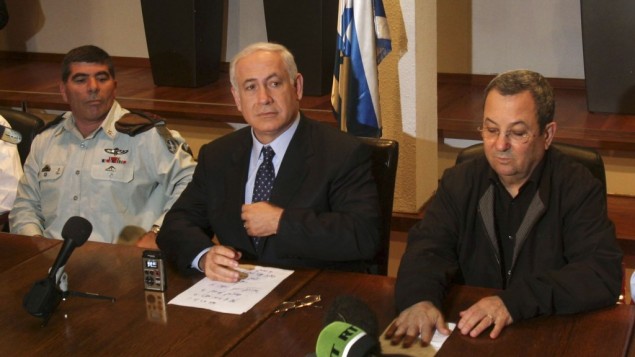
Security chiefs refused order from PM in 2010 to prepare military to strike Iran within hours if necessary, TV report says
Times of Israel
According to Channel 2, chief of staff and Mossad chief adamantly opposed demand to initiate highest level of military readiness, and Netanyahu and Barak backed down

rime Minister Benjamin Netanyahu and Defense Minister Ehud Barak ordered their security chiefs in 2010 to have the military ready to attack Iran’s nuclear facilities within hours if necessary, but were rebuffed by the security chiefs, an Israeli TV investigate news program claimed on Sunday.
The order to step up military readiness was given by Netanyahu and Barak to the then-chief of staff of the Israel Defense Forces, Gabi Ashkenazi, and to the then-head of the Mossad, Meir Dagan, at a meeting on an unspecified date, the report claimed. But Dagan reportedly retorted that the order, if followed, might lead to a war based on an illegal decision. And Ashkenazi, reportedly declaring that such an attack would be “a strategic mistake,” also warned that the very order to prepare for a strike might set in motion a deterioration into war even if Israel didn’t actually choose to launch one.
Netanyahu and Barak chose not to insist that the security chiefs follow their orders, the program indicated.
The dramatic events unfolded at a meeting of “the forum of seven” most senior ministers with the security chiefs in Jerusalem, the Channel 2 program, “Uvda” (Fact), claimed. The full documentary is to be broadcast on Monday; short excerpts were screened on Sunday night.
Netanyahu and Barak reportedly instructed the heads of the defense establishment to initiate the highest level of military alert and prepare the military for a strike — within hours if necessary — on Iran’s nuclear facilities. But the move was stymied.
The report cited sources close to Ashkenazi and Dagan – who since stepping down from their respective posts have both been outspoken in their opposition to a strike on Iran – to the effect that as the two men were leaving the meeting, Netanyahu “matter-of-factly” instructed them to initiate the “P Plus” code, which is essentially a readying of the military to imminently launch an attack.
Ashkenazi and Dagan reportedly vehemently objected to the order.
“This isn’t the sort of thing that you do unless you’re certain that you’ll end up launching an operation,” Ashkenazi was quoted as saying. “It’s like an accordion that makes music even if it is merely handled.”
According to the sources quoted by the report, Ashkenazi meant that the “P Plus” alert would cement “facts on the ground” that could trigger a chain of events that would culminate in war – whether or not Israel actively decided to pursue military conflict.
Dagan, the report said, was even more ardent than the chief of staff in his dissent.
“You may end up going to war based on an illegal decision,” the former intelligence chief was quoted as saying. “Only the security cabinet is authorized to make such a decision.”
Later, Dagan would say that “the prime minister and the defense minister tried to steal a war – it was as simple as that.”
But Barak had a different recollection of the events.
In an interview with “Uvda,” Barak charged that Ashkenazi hadn’t objected on legal grounds, or due to the possibility that a “P Plus” alert could precipitate war; rather, Barak said, the military chief had responded to the order by saying that the requested state of high readiness could not be implemented due to the fact that the army had not prepared an attack plan and thus lacked the operational capability to carry out an effective strike on Iran.
According to Barak, Ashkenazi had failed to prepare the army for the eventuality of military action, and admitted as much.
“The assumption that if the chief of staff doesn’t recommend a course of action, that that action isn’t operationally feasible, is baseless,” the defense minister – himself a former chief of General Staff – maintained in the “Uvda” interview. “A chief of staff must create the operational ability, he needs to tell us [the government] whether we have the operational ability to do something, and he even needs to give his recommendation, but [the government] is free to choose [a course of action] that contradicts his recommendation.
A “P Plus” state, Barak said, was by no means an indication that war is imminent.
The report did not make clear why Barak and Netanyahu chose not to insist on pushing forward with their decision, in the face of the objections from Ashkenazi and Dagan.
Ashkenazi, according to sources quoted by “Uvda,” fiercely denied that there was lack of readiness in the ranks of the IDF.
“Barak is not telling the truth,” the former chief of staff was quoted as saying. “I did prepare the option. The army was ready to attack, but I also said that attacking then would be a strategic mistake.”
